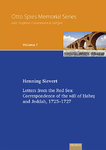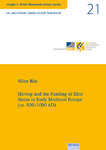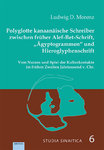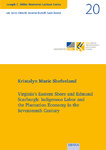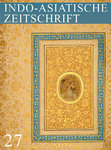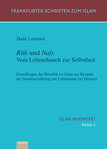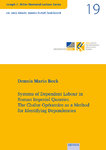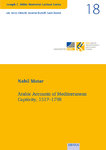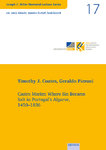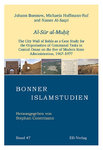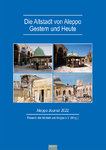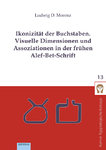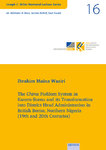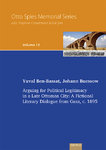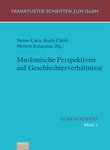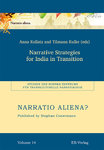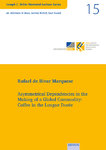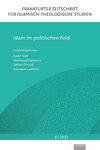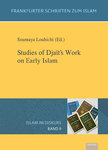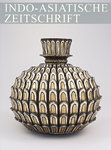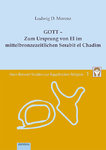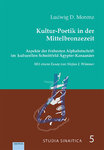- ISLAMWISSENSCHAFT
- ISLAMISCHE_STUDIEN
- JOSEPH C. MILLER MEMORIAL LECTURES SERIES
- ASIENWISSENSCHAFT
- ARCHÄOLOGIE ALS KULTURWISSENSCHAFT
- RELIGIONSWISSENSCHAFT
- RELIGIONSPÄDAGOGIK
- GESELLSCHAFT UND KIRCHE
- KIRCHE UND GEMEINDE
- GESUNDHEIT UND KRANKHEIT
- KINDERGARTENPÄDAGOGIK
- OPEN_ACCESS
- Neuerscheinungen
- In Vorbereitung
- News
- EBook
- Einzelkataloge
Categories ISLAMWISSENSCHAFT Reihe: Ulrich Haarmann Memorial Lecture Volume 18: Ibn Khaldūn versus the occultists at Barqūq’s court:
Volume 18: Ibn Khaldūn versus the occultists at Barqūq’s court:
Product no.: ISBN 978-3-86893-290-4
In stock
can be shipped within 3 days
86 pages, paperback,
14,8 x 21,0 cm, 2020
This brief monograph is a close examination of the chapter dealing with the occult “science of letters and names” (ʿilm al-ḥurūf wa-l-asmāʾ) in the sixth faṣl of Ibn Khaldūn’s (d. 808/1406) famous al-Muqaddimah. It is argued that his views on this Sufi occult discourse are best understood in light of a rising tide of interest in lettrism, other occult disciplines, and millenarianism among the learned classes of eighth/fourteenth century Cairo, especially at the court of his patron, the Mamluk sultan al-Malik al-Ẓāhir Barqūq. On the basis of multiple recensions of the work, the text is approached as one that the author adapted over time according to his shifting personal situation and contentions with various interlocutors. Particular attention is paid to Süleymaniye MS Damad Ibrahim 863, the recension prepared for donation to Barqūq’s sultanal library. A critical edition of the chapter on lettrism as it appears in that manuscript is included, as well as a new translation of the chapter.
The Author
Noah Gardiner is an Assistant Professor of Religious Studies in the Department of Religious Studies at the University of South Carolina. He received his Ph.D. in Near Eastern Studies in 2014 at the University of Michigan, and he was a Junior Fellow at Annemarie Schimmel Kolleg, Rheinische Friedrich-Wilhelms-Universität Bonn, in the 2015–16 academic year. His dissertation, “Esotericism in a manuscript culture: Aḥmad al-Būnī and his readers through the Mamlūk period,” was awarded the 2014 Bruce D. Craig Prize for Mamluk Studies. His research is on Sufism, the science of letters and other occult sciences, and Arabic manuscripts and manuscript culture, all with a focus on the late-medieval Arabic-speaking Mediterranean. He is currently working on two book projects, one on the arch-lettrist Aḥmad al-Būnī and his reception, and the other on a renaissance of learned occultism in Cairo and other Mamluk cities in the eighth/fourteenth and ninth/fifteenth centuries.
Among his publications are: Co-editor with Matthew Melvin-Koushki, Islamicate Occultism: New Perspectives, special issue Arabica 64/3–4 (2017), pp. 287–693. | “Books on Occult Sciences,” in Treasures of Knowledge: An Inventory of the Ottoman Palace Library 1502/3, ed. Gülru Necipoğlu, Cemal Kafadar, and Cornell Fleischer, Muqarnas Supplements 14 (Leiden: Brill, 2019), pp. 557–587. | “The Occultist Encyclopedism of ʿAbd al-Raḥmān al-Bisṭāmī,” Mamlūk Studies Review 20 (2017), pp. 3–38. | “Esotericist Reading Communities and the Early Circulation of the Sufi Occultist Aḥmad al-Būnī’s Works,” in Islamicate Occultism: New Perspectives, pp. 405–441. | “Stars and Saints: The Esotericist Astrology of the Sufi Occultist Ahmad al-Buni,” Journal of Magic, Ritual, and Witchcraft 12/1 (2017), pp. 39–65. | “Forbidden Knowledge? Notes on the Production, Transmission, and Reception of the Major Works of Aḥmad al-Būnī,” Journal of Arabic and Islamic Studies 12 (2012), pp. 81–143. | With Frédéric Bauden, “A recently discovered holograph fair copy of al-Maqrīzī’s al-Mawāʿiẓ wa-al-iʿtibār fī dhikr al-khiṭaṭ wa-al-āthār: University of Michigan Islamic MS 605,” Journal of Islamic Manuscripts 2 (2011), pp. 123–131.
Customers who bought this product also bought
|
|
|
|
|
|
|
Browse this category: Reihe: Ulrich Haarmann Memorial Lecture



